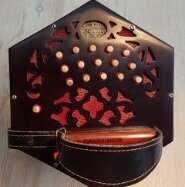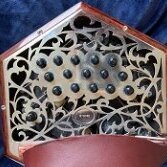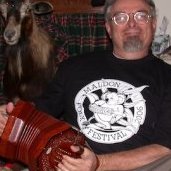-
Posts
237 -
Joined
-
Last visited
Contact Methods
-
Website URL
https://www.youtube.com/channel/UCyfaF1wA2EZagdS7E8i3ixw/featured
Profile Information
-
Interests
20 button anglo, composition
-
Location
Worcestershire
Recent Profile Visitors
2,081 profile views
Kathryn Wheeler's Achievements

Chatty concertinist (4/6)
-

Staffordshire Hornpipe / Heresfordshire Lasses
Kathryn Wheeler replied to Jim Besser's topic in Concertina Videos & Music
And I do think I'm in the worst one for that Worcestershire - although maybe you're used to that with the sauce! And don't get me onto all the different pronounciations I've heard. It's got quite amusing watching Diners, Drive-ins and Dives as they use the sauce a _lot_ making lovely barbeque stuff from scratch! -
Kathryn Wheeler started following "Drive the Cold Winter Away", harmonic style tab for Anglo , Chords questions, notation, playstyle , Harmony and drones.. and 4 others
-

Chords questions, notation, playstyle
Kathryn Wheeler replied to Victor F's topic in Teaching and Learning
There are many ways to play a C chord (I'd only use that bottom C sometimes if I wanted some extra bassiness). You don't have to play all the notes, or you could double up some of the notes (as done here). No rules really - just use whatever you think sounds good or feels good. You don't have to play the third of the chord (the E here in a C chord) or you could just play the C and the E and no G (especially, say, if you have the G in the melody). It's funny you say this, because I was literally only yesterday showing someone the suggested chords in this book - they're a really good starting point but there are often many ways to play the same chord on an anglo. Even on a 20 button. For example - if you want a C chord, you could basically mash together any notes on the C row and make one! Or play cross row and choose your C from the C row, the G immediately below it on the G row and then the E next to the C - a nice triangle shape of buttons! (Triangle chords as I call em! If you play that pattern of buttons up and down on push and pull you can find other chords!) -
I don't play Irish music, but I would be experimenting with what sounds good or interesting. From what I know the harmonic accompaniment is often extremely bare in that style, with some bits here and there. It's all about the horizontal flow of the melody and it's ornamentation? It's almost like any other notes are a kind of ornamentation. There are some harmony "rules" about what notes can be useful. Do a bit of research on chords and how they're formed and the chords that go with the notes of scales of different keys. If you've just got one big long Fsharp and you want to put some accompaniment in to go with it, you could try any notes in the chord of Fsharp major (F# A# C#) or Fsharp minor (change it to a non sharpened A) - I think it's probably most likely it'd be a F sharp minor as that's most commonly used in folk music, for example. OR it could be a chord of D major (which has an F sharp in it) so you could try any notes from D F# A. There are other chords you can use (and I've just read the other response above which has some others). Experimentation is the best bet as it can throw up some really interesting and unexpected sounds which can be used for effect.
-

Staffordshire Hornpipe / Heresfordshire Lasses
Kathryn Wheeler replied to Jim Besser's topic in Concertina Videos & Music
I see! And isn't Todley Tom a great name! Oo by the way, it is Herefordshire - it's the next county over to where we are in Worcestershire -

Staffordshire Hornpipe / Heresfordshire Lasses
Kathryn Wheeler replied to Jim Besser's topic in Concertina Videos & Music
You know, I've had your playing of Staffordshire Lasses as an earworm the last few days, haha! I like the staccato accompaniment with the occasional run down. Are these both tunes you play for dancing? -
Nice! I love the angle from which you're videoing this. You can see both sides and what you're playing nice and clearly.
-
This is a short snippet of Just As the Tide Was Flowing*. It's a traditional song, but I started playing it for accompanying Border Morris dancing. Specifically for a dance we do in Bow Brook Border Morris that goes by the same name (but we call Tides). The dance was originally devised by the Witchmen side, who are a very inventive lot, coming up with a lot of popular dances. I think this snippet captures the feel of the dance - specifically the A section here represents a figure where partners cross over for four, turn and then stick for 4 (which is repeated). This is then followed by standing and sticking in the B section. What I play during the dance really depends on what the dancers are doing. In the very flowing (and rather raunchy) repeated "choruses" what I'd do is fuller and more rhythmic than what I'd do in the figures (like verses - the dancing changes every time). In the figures I vary things up - sometimes I'd do melody in octaves, sometimes I'd do a countermelody (and sometimes there are other musicians). The full range of what I tend to do is in the full video I've already posted. *I've already posted a full video.
-

"Drive the Cold Winter Away", harmonic style tab for Anglo
Kathryn Wheeler replied to Steve Moore's topic in Tunes /Songs
Ah! This is one of my favourite winter songs! -

Holding Anglo Concertinas
Kathryn Wheeler replied to geoffwright's topic in General Concertina Discussion
Thanks! It would be nice to do more singing, if I could only remember the words! -

Holding Anglo Concertinas
Kathryn Wheeler replied to geoffwright's topic in General Concertina Discussion
Darn, mine only supply melodies to others’ words. And is no use when I’ve forgotten words! -

Holding Anglo Concertinas
Kathryn Wheeler replied to geoffwright's topic in General Concertina Discussion
This is SO true. They come up with the tunes, too!







